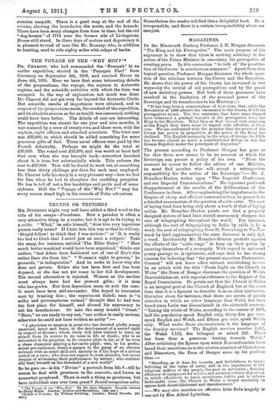TRUTHS OR TRUISMS.t
Ma. STESEING might very well have added a third word to the title of his essays—Paradoxes. Now a paradox is often a very attractive thing to a reader, but it is apt to be trying to a critic. " What," he asks himself, "does this very ingenious person really mean P If I take him this way or that he will cry, Stupid fellow ! to think that I was serious !' or It is really too bad to think that I could jest on such a subject.' Take the essay, for instance, entitled 'The Elder Sister." " How much better mankind would have been organized," thinks our author, "had Adam been fashioned out of one of Eve's ribs rather than she from his." " Woman's right to govern," he proceeds, "is indisputable." And he seeks to know why she does not govern. Either she has been first and has been deposed, or she has not yet come to her full development. The second alternative is rejected. Woman as the mother must always have had her present gifts; it is man who has grown. Nor does deposition seem to suit the case.
It must have been self-surrender. She hoped to humanize man by trusting him ; the experiment failed ; man is "a sulky and presumptuous animal," thought that he had won the first place for himself, and abused his supremacy to rob his benefactress. Or take the essay headed "Great." "Here," we are ready to cry out, "our author is really serious, otherwise he could not have written so nobly ":—
"A physician or surgeon is great who has devoted gladly young manhood, heart and brain, to the development of a second sight in respect of disease ; whom study will have trained to trace an attack from its source to its issue in life or death; who is as interested in its progress, in its counter plots to his, as if he were a chess champion playing a favourite pupil ; who, in his profes- sional pre-eminence, treats a pauper in the grasp of an obscure sickness with as much skill and anxiety as if the hope of a nation rested on a cure ; who does not expect to work miracles, but never despair of witnessing their performance by nature ; who continu- ally feels himself on the threshold of a new world."
So he goes on—is his "Divine" a portrait from life ?—till he comes to deal with greatness in the concrete, and leaves us somewhat perplexed. There is such a thing as greatness, but have individual men ever been great P Inieeit serupulunt nobis.
• ma Voyage of the • Why Not?' By Dr. Jean Cheroot. English version by Philip Walsh. London Hodder and Stoughton. [Ws. net.) l'Tvuths or Truisms. By William mobbing. London: Henry Frovrde. (Is.
set.] Nevertheless the reader will find this a delightful book. He is irresponsible, and there is a certain irresponsibility about our essayist.






































 Previous page
Previous page